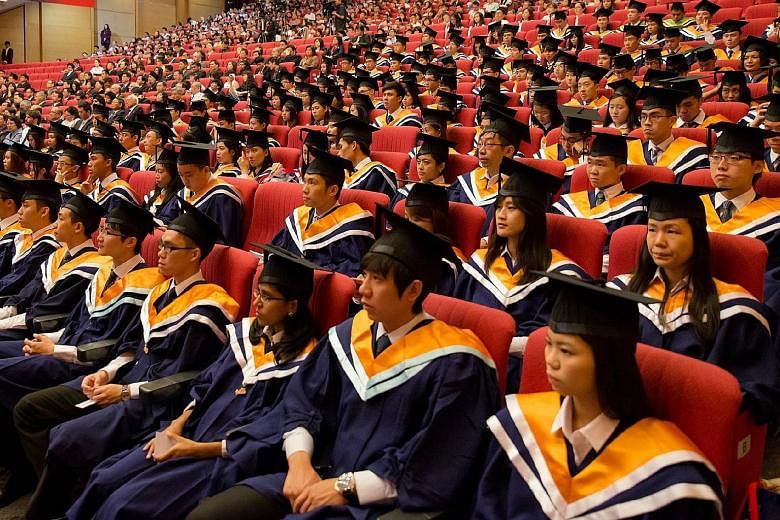SINGAPORE - The National University of Singapore (NUS) has become Asia's top university, while Nanyang Technological University (NTU) continues its climb up the world rankings.
In the Times Higher Education World University Rankings released on Thursday (Oct 1), NUS, which edged up one spot to 25th position last year, fell back to 26th place but emerged as Asia's top university.
Tokyo University, which won the accolade last year, plunged by 20 places to 43rd position.
NTU moved up six spots to 55th position in the ranking published by the Times Higher Education magazine based in London.
This follows a stellar showing by both universities in the Quacquarelli Symonds (QS) World University Rankings issued a fortnight ago. NUS took the 12th spot, up from 22nd last year, and NTU was placed 13th, up from 39th.
-
Top universities
-
1. California Institute of Technology
2. University of Oxford
3. Stanford University
4. University of Cambridge
5. Massachusetts Institute of Technology
6. Harvard University
7. Princeton University
8. Imperial College London
9. ETH Zurich - Swiss Federal Institute of Technology Zurich
10. University of Chicago
26. National University of Singapore
55. Nanyang Technological University
•For the full list, go to: www.timeshighereducation.co.uk/world-university-rankings/
Mr Phil Baty, editor of the Times ranking, said: "Singapore is a strong performer. Singapore now boasts Asia's No. 1 university, NUS, and NTU sits in its highest place."
NTU's rise in recent years has been largely due to its improved score in research, he said.
The NUS' drop of one spot was "negligible", and it is common for institutions to move up or down by a few places when they are in the top 30, he added.
The California Institute of Technology was placed No. 1 globally, followed by the University of Oxford and Stanford University.
The Times ranking, considered one of the more comprehensive university rankings, uses 13 indicators - including research, knowledge transfer and international outlook - to assess a university.
This year, it ranked 800 universities from 70 countries, up from 400 last year. The top 800 list represents just 4 per cent of the world's higher education institutions.
The list was expanded to give a "much more inclusive and comprehensive picture of the global university landscape", Mr Baty said.
A switch from the Thomson Reuters research database to Elsevier's Scopus research database resulted in research being assessed through more than 11 million research papers, up from six million last year.
The Times ranking also achieved a more representative sample for its academic reputation survey, in which professors are asked to rate universities in the disciplines they specialise in, Mr Baty added.
It distributed the survey in 15 languages this time, up from nine the previous year. Using United Nations data on the distribution of scholars around the world, it achieved a much better geographical spread.
"In particular, we have been able to correct an over-representation of US scholars seen in the past," said Mr Baty.
Referring to the Times and QS rankings, NTU president Bertil Andersson said: "Although the two indices use different methodologies, they show one common trend: NTU is on a rapid upward trajectory."
Since 2012, NTU has climbed 34 places in the QS ranking and 31 places in the Times ranking.
Professor Andersson added that rankings are useful for young universities such as NTU as it allows them to be benchmarked against the best in the world, but stressed that rankings are not the focus.
"We are focused on our fundamentals - to create a world-class environment for learning, teaching and research," he said.
NUS president Tan Chorh Chuan said he and his staff are pleased that NUS has been placed among the leading universities in the world and top in Asia.
"Our achievements are the result of the strong support from the Government, as well as commitment to excellence by our faculty, staff and students," he said.
Mr Baty added: "NUS' new position as Asia's top university and among the very best of the world's elite research universities is thoroughly deserved."


